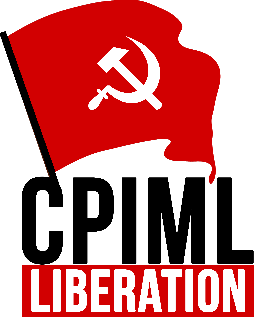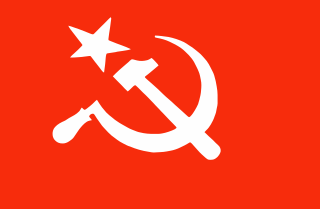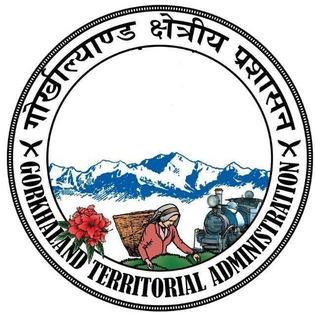Related Research Articles

The Communist Party of India (Marxist) (abbreviated as CPI(M)/CPIM/CPM) is a communist political party in India. It is the largest communist party in India in terms of membership and electoral seats and one of the national parties of India. The party emerged from a split in the Communist Party of India (CPI) on 7 November 1964. As of 2022, CPI(M) is a part of ruling alliances in three states — the Left Democratic Front in Kerala, Mahagathbandhan in Bihar, and the Secular Progressive Alliance in Tamil Nadu. CPIM has representation in the legislative assemblies of 8 states.

The Communist Party of India (CPI) is the oldest communist party in India and one of the eight national parties in the country. The CPI was founded in modern-day Kanpur on 26 December 1925.
Jharkhand Disom Party was a political party in India. The party was founded 2002 by Bharatiya Janata Party Member of Parliament Salkhan Murmu. The party works for the rights of the Adivasi peoples. For example, the party works for more quotas and reservations for Adivasis.

The Communist Party of India (Marxist–Leninist) Liberation (abbreviated: CPI(ML) or CPI-ML or CPIML(L) or CPI-ML(L) or CPIML Liberation) also referred to as the Liberation Group, is a Communist political party in India.

The Adivasi refers to inhabitants of the Indian subcontinent, generally tribal people. The term is a Sanskrit word coined in the 1930s by political activists to give the tribal people an indigenous identity by claiming an indigenous origin. The term is also used for ethnic minorities, such as Chakmas of Bangladesh, Adivasi Janjati of Nepal, and Vedda of Sri Lanka. The Constitution of India does not use the word Adivasi, instead referring to Scheduled Tribes and Janjati. The government of India does not officially recognise tribes as indigenous people. The country ratified the International Labour Organization (ILO) Convention 107 on Indigenous and Tribal Peoples of the United Nations (1957) and refused to sign the ILO Convention 169. Most of these groups are included in the Scheduled Tribe category under constitutional provisions in India.

The Kurukh or Oraon, also spelt Uraon, or Dhangar are a Dravidian speaking ethnolinguistic group inhabiting Chhotanagpur Plateau and adjoining areas - mainly the Indian states of Jharkhand, West Bengal, Odisha and Chhattisgarh. They predominantly speak Kurukh as their native language, which belongs to the Dravidian language family. In Maharashtra, Oraon people are also known as Dhangad or Dhangar.

Darjeeling District is the northernmost district of the state of West Bengal in eastern India in the foothills of the Himalayas. The district is famous for its hill station and Darjeeling tea. Darjeeling is the district headquarters.

Shikharji, also known as Sammed or Sammet Shikharji, is one of the Holiest pilgrimage sites for Jains, in Giridih district, Jharkhand. It is located on Parasnath hill, the highest mountain in the state of Jharkhand. It is the most important Jain Tirtha by both Digambara and Śvētāmbara, for it is the place where twenty of the twenty-four Jain tirthankaras along with many other monks attained Moksha. It is one of the five principal pilgrimage destinations along with Girnar,Pawapuri, champapuri, Dilwara, Palitana and Ashtapad Kailash.
Ganesh N. Devy is an Indian literary critic and former professor. He is known for the People's Linguistic Survey of India and the Adivasi Academy created by him. He is credited to start the Bhaashaa research and Publication Centre. He writes in three languages—Marathi, Gujarati and English. His first full length book in English is After Amnesia (1992). He has written and edited close to ninety books in areas including Literary Criticism, Anthropology, Education, Linguistics and Philosophy.

The Socialist Unity Centre of India (Communist) or SUCI(C), previously called the Socialist Unity Centre of India and "Socialist Unity Centre", is an anti-revisionist Marxist-Leninist communist party in India. The party was founded by Shibdas Ghosh, Nihar Mukherjee and others in 1948.
The Maoist Communist Centre (MCC) was one of the largest two armed Maoist groups in India, and fused with the other, the People's War Group in September 2004, to form the Communist Party of India (Maoist).

The Naxalite–Maoist insurgency, officially referred to as the Left Wing Extremism (LWE), is an ongoing conflict between Maoist groups known as Naxalites or Naxals and the Indian government. The area of the insurgency is known as the red corridor, which has been steadily declining in terms of area and number of violent incidents; in 2021 it was confined to the 25 "most affected" locations and 70 "total affected" districts across 10 states in two coal-rich, remote, forested hilly clusters in and around the Dandakaranya-Chhattisgarh-Odisha region and the tri-junction area of Jharkhand-Bihar and West Bengal.
Operation Lalgarh was an armed operation in India against the Maoists who have been active in organising an armed tribal movement alongside a group called the People's Committee Against Police Atrocities (PCAPA). The operation is organised by the police and security forces in Lalgarh, Jhargram, West Bengal to restore law and order in the area and flush out the Maoists. The area of operation is said to be expanded to 18 police stations in the three Maoist-affected districts of Paschim Medinipur, Bankura and Purulia.

Chuar rebellion, also known as Jungle Mahal movement was a series of peasant movements between 1766 to 1816 by the tribal inhabitants of the countryside surrounding the Jungle Mahals settlements of Midnapore, Bankura and Manbhum against the rule of the East India Company (EIC). This was the first revolt against the East India Company (EIC) in Chotanagpur areas of Bengal Presidency.
Agragami Adivasi Samiti is an organisation for Adivasi people in West Bengal, India. The organisation is linked to the All India Forward Bloc.

The Gorkhaland Territorial Administration is a semi-autonomous council for the Darjeeling and Kalimpong districts of West Bengal state in India. The GTA was formed in 2012 to replace the Darjeeling Gorkha Hill Council, which was formed in 1988 and administered the Darjeeling hills for 23 years.
The Mahila Atma Raksha Samiti was a women's movement in Bengal, India. MARS was a mass organisation linked to the Communist Party of India.
The Lok Sewak Sangh, or Manbhum Lok Sewak Sangh, was a political party in Purulia District, West Bengal, India. LSS was founded in 1948. The party was the main political force in Purulia District from the independence of India until the fall of the second United Front cabinet.
Bibhuti Bhusan Das Gupta was an Indian freedom fighter and politician.
Dheklapara Tea Garden is a village in the Madarihat Birpara CD block in the Alipurduar subdivision of the Alipurduar district in the state of West Bengal, India.